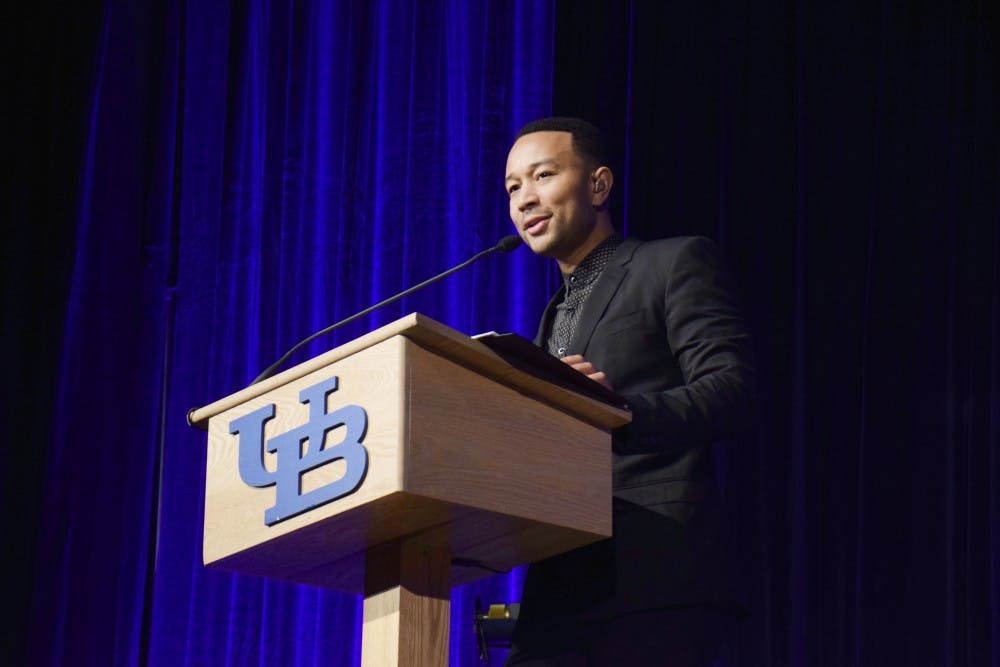During February of 1994 in his small hometown of Springfield, Ohio, 15-year-old John Roger Stephens submitted an entry to McDonalds’ annual “Black History Makers of Tomorrow” essay contest.
Stephens wrote about how he truly believed, one day, he would become a famous singer who would change the world with his not only voice, but with his actions as well.
Fast-forward 21 years, and John Roger Stephens from Springfield, Ohio, now 36, has become known worldwide as John Legend, a nine-time Grammy Award-winning musician who also has a Golden Globe and an Academy Award on his growing list of achievements.
But, more importantly, Legend has done everything he once said he would in that essay contest all those years ago – he’s become a man and can say he changed the world for the better.
On Thursday, Legend spoke and performed for a sold-out Alumni Arena as apart of UB’s third Distinguished Speakers Series event of the semester.
Over the course of an hour and a half, Legend talked to the crowd about taking control of fear in order to change oneself and the world, as well as self-empowerment and how believing in yourself can make all the difference.
“We may have more in common than you think,” he said.
What was different, he said, was how he looked at the world – with self-confidence and undying determination – a viewpoint he tried to explain to the audience his speech.
“I want you to leave this place with the ability to conquer your fears,” he said. “Believe in yourself, be persistent and don’t take no for an answer.”
He spoke about his past upbringing, his current fight against poverty and educational inequality and his vision for the future. And, at the end, Legend even took a seat at the Yamaha grand piano onstage to entertain the crowd with two of his songs: “Ordinary People” and “All of Me.”
Legend’s speech was as equally a call for self-empowerment as it was a call to action.
“What’s going to stop you?” Legend said.
Throughout the night, Legend tried to show that his own life and upbringing wasn’t special – that anyone could change the world.
“I’m excited by your potential,” Legend said to the crowd. “I’m excited by the power you have inside of you.”
Legend was homeschooled until high school and attended the University of Pennsylvania on a scholarship to study English and African-American studies.
He said his most influential role models were his parents.
“My parents taught me about character,” he said. “About what it means to live a good life and what success is – not money or material things, but love and the people you are able to help and touch.”
When he was 10 years old, however, Legend’s grandmother died – a death that sent his family into turmoil. His mother became severely depressed and addicted to drugs and his parents divorced.
Despite that, the lessons his parents taught him as a child, Legend said, have guided him through his life to today. It was his parents’ teachings that helped him turn his hardships and self-doubt into motivation and self-confidence.
“There is no excuse for inaction,” Legend said. “Everybody can be great because everybody can serve – think about what it means to love people you don’t even know.”
Nowadays, Legend honors his parents by trying to spread the same self-respect and self-belief that they instilled in him, through music, philanthropy and social change.
Legend, when not writing award-wining music, is a heavily-involved philanthropist who devotes his time developing education policy and combating poverty as national board member for Teach for America, Education Equality Project, Harlem Village Academies, PopTech and Stand for Children. He also is heavily involved in reforming the judicial and prison systems, which are heavily abusive and racist, he said.
Fighting against education, poverty and racism are his passions outside of music.
He asked the audience to find within themselves something they are as passionate about.
“Whatever your passion is I want you to follow it,” he said. “To empower yourself to make a change.”
Brian Windschitl is the senior arts editor and can be reached at brian.windschitl@ubspectrum.com.





